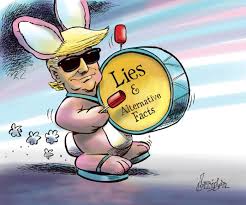 Talisse and I have a short piece over at 3QuarksDaily on the heat/light ratio in the ‘Alternative Facts’ reaction.  In many ways, it’s a follow-up to John’s earlier observation that Conway, on a more charitable interpretation, should have used a term like ‘rebutting’ or ‘complicating’ facts, since she’s talking about the evidence for the attendance claims.
Talisse and I have a short piece over at 3QuarksDaily on the heat/light ratio in the ‘Alternative Facts’ reaction.  In many ways, it’s a follow-up to John’s earlier observation that Conway, on a more charitable interpretation, should have used a term like ‘rebutting’ or ‘complicating’ facts, since she’s talking about the evidence for the attendance claims.
The point: a little training in the argumentative culture of the humanities helps with these distinctions. The sad irony is that a representative of the Trump administration is hamstrung by the use of language in an area the administration is actively trying to undermine.